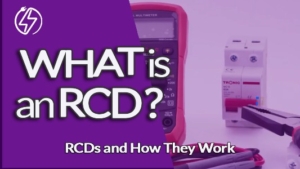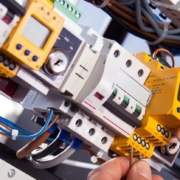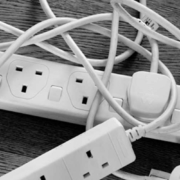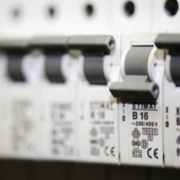What is an RCD?
What is an RCD and How Does it Work?
RCDs, or Residual Current Devices, are essential safety devices that can help protect you from the dangers of electric shock. After all, accidents happen, and the consequences of electrical accidents can be severe, even life-threatening. But what exactly is an RCD, and how does it work to keep you safe?
Simply put, an RCD is a device that detects electrical faults and instantly shuts down the circuit to stop the flow of electricity. This reduces the risk of electric shock and helps prevent electrical fires caused by faulty equipment. So, why is this important? Let’s dive deeper into the workings of RCDs to understand how they can make a real difference in protecting both you and your equipment.
What Does an RCD Do?
An RCD constantly monitors the flow of electricity through a circuit. If it detects an imbalance between the live and neutral wires, meaning that some of the electricity is flowing where it shouldn’t be (like through a human body), it will cut off the power almost instantly. This action drastically reduces the risk of electric shocks and fires.
The RCD does this by breaking the circuit, stopping the flow of electricity and providing crucial protection before harm can be done. It’s one of the simplest yet most effective ways to safeguard against electrical hazards.
What Causes an RCD to Trip?
An RCD trips (or cuts the power) when it detects an imbalance or fault in the current flowing through the circuit. This imbalance can occur for a number of reasons, such as:
-
- Earth leakage: When electricity escapes the circuit and flows through an unintended path (like a person or water).
- Faulty wiring: Deteriorating or damaged wiring can cause irregular current flow.
- Overload: Too much electrical current flowing through the circuit can trip the RCD as a safety measure.
- Electrical faults: Malfunctioning electrical appliances or equipment can also lead to a trip.
It’s important to know that while an RCD is incredibly effective at preventing electric shocks, it’s not foolproof. You should still be cautious when handling electrical devices, as there are instances where an RCD might not trip, such as with certain types of faults or when wiring is severely degraded.
RCD the Same as a Circuit Breaker?
No, an RCD is not the same as a circuit breaker, though they do serve similar functions.
-
-
- RCDs are primarily designed to protect against electric shocks caused by earth leakage (current flowing through the body).
- Circuit breakers, on the other hand, are mainly used to prevent overcurrent or overload situations by automatically shutting down the circuit if too much current flows through it.
-
So, while both are safety devices, they protect you from different types of electrical issues. In many modern electrical setups, both devices are used together to ensure comprehensive protection.
When Should an RCD Be Used?
RCDs should be used in all electrical systems to ensure the safety of those using the equipment. Specifically, they are crucial in the following situations:
- In homes and offices: Anywhere there’s a risk of electric shock, particularly around water (kitchens, bathrooms, outdoor areas).
- In construction sites: Where the environment is more prone to electrical hazards.
- On outdoor appliances: Like lawnmowers and power tools.
- For sensitive equipment: Ensuring that your computers or other electronic devices are protected from electrical faults.
An RCD is a must-have safety feature, not just for homes but also for businesses, construction sites, and public spaces where electrical safety is a top priority.
Types of RCDs
There are a few different types of RCDs, and each has its own specific use case:
Fixed RCDs
These are typically installed in the fuse box or distribution board. They provide continuous protection for the entire circuit and are ideal for home and business installations.
- Portable RCDs
These are designed to be plugged into any socket, offering protection on the go. Portable RCDs are often used on construction sites or in temporary setups where it’s not practical to install a fixed RCD. - Socket Outlet RCDs
These RCDs replace regular socket outlets and provide protection for devices plugged into them. They’re commonly found in extension leads and outdoor outlets, providing extra safety when using power tools, lawnmowers, or other equipment.
What Would Trip an RCD?
An RCD is a highly reliable device, but there are times when it may trip. Some common reasons include:
-
-
- Electrical faults: A damaged appliance or faulty wiring can cause the RCD to trip.
- Water or moisture: If water leaks into electrical components, it can trigger the RCD as a safety measure.
- Overloaded circuits: Drawing too much current through a circuit, such as running multiple appliances at once, can cause an overload and trip the RCD.
-
Testing Your RCD
It’s essential to test your RCD every 3 months to ensure it’s working properly. Most RCDs have a built-in test button that simulates an electrical fault, causing the RCD to trip. If it doesn’t trip when you press the test button, it could indicate a fault, and you should contact an electrician to have it checked out.
What Are RCBOs?
An RCBO (Residual Current Breaker with Overload) combines the functionality of an RCD and a circuit breaker. It protects against both earth leakage (like an RCD) and overcurrent (like a circuit breaker). RCBOs are commonly used in circuits where both types of protection are needed, such as in larger electrical installations or areas with high electrical usage, like IT rooms with lots of computers.
For More Information on RCDs
Understanding RCDs and how they can protect you is crucial, whether you’re setting up a new electrical system or just ensuring your current setup is safe. For any questions or assistance with installation and maintenance, don’t hesitate to reach out to one of our expert engineers. We’re here to help you stay safe!
In Conclusion
RCDs are an important safety measure in any electrical system, reducing the risk of electrical shock and fires. By understanding how they work, testing them regularly, and using them in the right situations, you can significantly improve the safety of your home or workplace. Whether you’re installing a fixed RCD in your fuse box or using a portable RCD on a construction site, it’s essential to ensure these devices are always in top working order. Stay safe!





